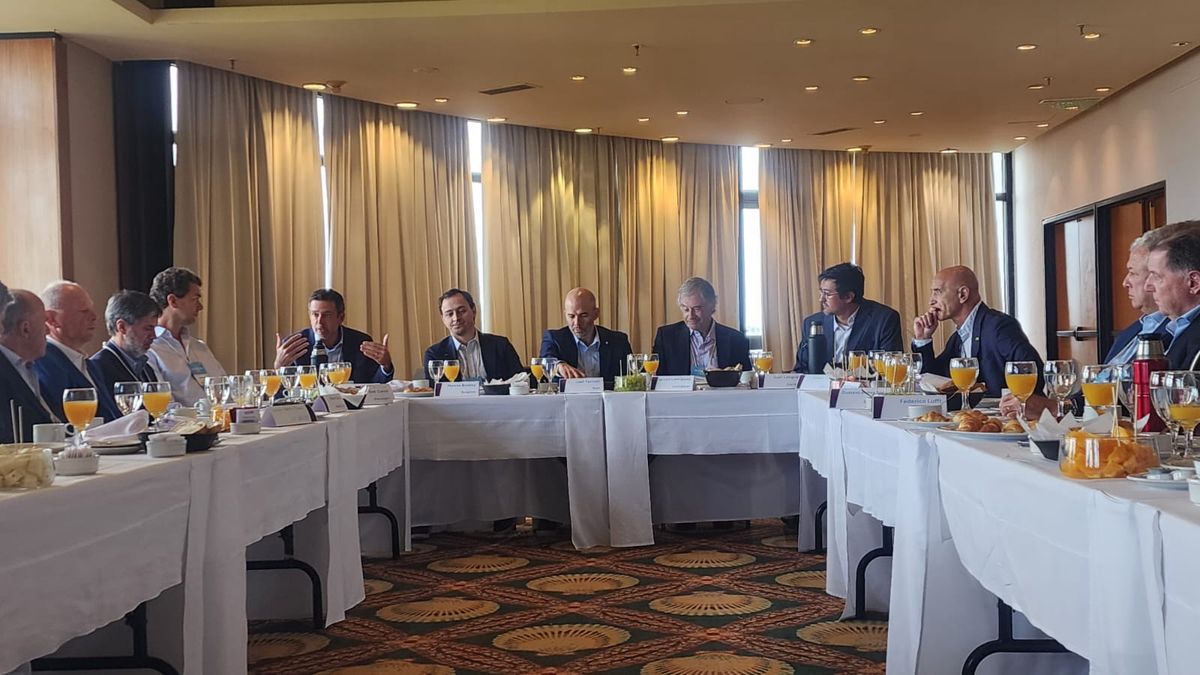Special envoy Idea Colloquium.- Scope participated in a round of debate given to the press by the main CEOs of the agricultural production and export chain, within the framework of the IDEA Colloquium. From there they focused attention on several key points: reduction of withholdings, and the need to conclude commercial agreements. They assured that it is very important to look at the development of Brazil and Chile, which boosted their production within the framework of greater research, technology and long-term policies with predictability in the economy.
The breakfast was attended by Adecoagro (Mariano Bosch and Diego Del Carril), BASF (Gustavo Portis), Bayer (Juan Farinati), CN Group (Eduardo Gómez Naar), Corteva (Juan Lariguet), Benetton Group (Agustín Dranovsky), Lartirigoyen (Ignacio Lartirigoyen and Luis Colmegna), Milicic SA (Frederick Lufft), NUSEED SA (Rubén Dicún), Syngenta (Marcos Bradley) and Tempra SA (Gustavo Armendariz).
In his speech, Ignacio Lartirigoyenexpressed that the countryside is a fundamental sector and that, among the claims of agriculture are that of strengthen legal certainty and the need to have a foreseeable horizon. In that sense, he highlighted that the producer in Argentina is resilient and that it is necessary to move forward with the deregulation. On the other hand, he highlighted that although it was very necessary to consolidate the macroeconomy, it is also essential reduce costs and for this you need improve infrastructure.
As for the withholdings stated that it is necessary in the short term to have a systematic plan to lower them and also advocated the need for a tax reform as a way to reduce the tax burden. At the same time, he highlighted that it is extremely essential to improve connectivity within agriculture and highlighted the use of Starlink that provides satellite internet. Regarding international trade, he stated that in the future, Argentina must open up to the world and to do so add more trade agreements with other countries.
For its part, Mark Bradley of Syngentafocused on two areas: the need for the use of technology and trade agreements. “Latin America is a net exporter and producer of food for the world, it already produces more food than North America, it is going to export much more and has much more growth potential as a region“, he said and getting fully involved in Mercosur said that “it is a large producer of grains” but that “our sights are set on the expansion of Brazil and in this regard he illustrated: “Brazil in 1985 produced the same amount of grains as Argentina, and today it grew exponentially.”
To do this, he compared the strong development of the neighboring country and provided what he believes is needed to achieve it: “There is growth in the area on the Brazilian side, but these differences have a clear framework, most obviously, of investment in technologyin genetics, because agriculture has long cycles, “We need long-term policies that give us stability to continue growing.” In this regard, it provided data to complete the growth potential: there are studies that explain that Argentina can grow its exports by up to 74%, which would be US$35 billion more as a sector.
The experience of Brazil and Chile in the agricultural sector
Juan Lariguet of Corteva expressed that, if we talk about Argentina, there is a very big gap between what we are producing and what we could produce, in terms of cornbut above all to soy. “We realize that With existing technology, innovation already registered and with good practices, the gap in what is corn can be closed by more than 95%which tells us that we are on equal terms in innovation with the rest of the productive countries, mainly we would have to compare ourselves with the United States and Brazil,” he explained.
But perhaps the biggest conflict is with soybeans. “We cannot close the gap because For more than four decades we have been working with regulations that complicate progress and, on the other hand, the innovations that the world has had in four decades. Brazil, at the beginning of the 2000s, produced fewer tons per hectare of soybeans than we did. Today, 25 years later, it has twice the area of soybeans and produces 500 kilos on average than Argentina.”
In this regard, he advocated that there be a logical framework of intellectual recognitionwhich allows youhave the necessary investment to be able to return to the race of genetic gain and shorten that gap of performance. “Again, in corn we are at the height of the world in delivering the yield resulting from innovation, we lack predictability for the transformation of that corn and not exporting 70% of the grains. And in soybeans we lack predictability to increase genetic gain and shorten the gap. For example, developing a hybrid, a variety of soybeans, takes between 10 and 15 years. Developing a new molecule takes 10 years of investment, the investment is very high,” he added.
Juan Farinati from Bayer also highlighted the experience of Chilifrom where he held, “There is an impressive quality fruit export industry, with the same climatic conditions on this side” and compared with the production of Argentina of which he said, “our cherry export industry is almost non-existent”a market that has a strong export reach towards China. So, you asked yourself, what’s the difference? 40 continuous years in Chile of clear policies that favor that sector, the agro-exporter, it was answered.
Withholdings: strong request for a reduction plan
From the table the conclusion is in unison: “For us it is very clear that the Government has to lower withholdings, it is what it promised to do and it is what it has been showing. So now our expectation is that it will continue doing so, that the trend will continue. What is clear is that last year’s withholdings fell by 20%, point by point.”
The leaders of the sector raised what would have happened if the withholdings in the last 20 or 30 years had been directed to agriculture, in this regard they called to reflect that the towns and cities had grown enormously and their potential. For them, if withholdings are reduced or directly eliminated “The farmer could think about doing projects to scale even further and just generate production.”
Source: Ambito




